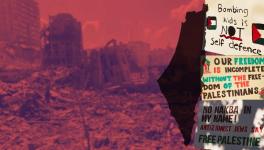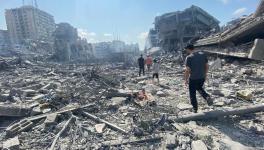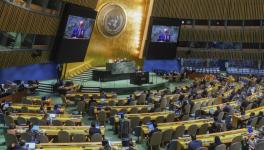The Gatekeepers: Exposing Israel's Dark Side
Dror Moreh is one of Israel's leading cinematographers. Last October, his documentary featuring candid dialogues with former Shin Bet heads debuted in New York.
In early 2013, other Western venues will show it. Over the weekend, it premiered at Tel Aviv's Cinematheque.
Segmented titles include Forget Morality, Collateral Damage, and One Man's Enemy is Another Man's Freedom Fighter.
Interviews with six former Shin Bet heads were shown. They attended the Israeli premier. Joseph Cedar's drama Footnote was included. More on film content below.
On December 18, Haaretz headlined "Israeli film makes critics' best of 2012 list, moves closer to Oscar."
It's won other international awards. It stops well short of telling all. It's still must viewing. It reveals what Israeli supporters need to know. Palestinians, of course, can explain best.
New York Times and Los Angeles Times film critics call it one of the best 2012 documentaries. It made the Academy Awards' short list.
On November 25, New York Times film critic AO Scott headlined "Six Israeli Spymasters on a Shadowy Past and a Dark Future," saying:
They're retired. They reflected "about past triumphs and frustrations." Avraham Shalom, Yaakov Peri, Carmi Gillon, Ami Avalon, Avi Dichter, and Yuval Diskin were interviewed.
They approved the film. Their views reflected former Prime Minister Ehud Olmert's warning that Israel faced national suicide if decades of occupation didn't end.
Extremist settlers reflect much about Israel's dark side. Messianic interlopers have no place in civil society.
Perhaps fears of Israel's demise motivated them to speak. Doing so may help save the country, they likely feel. Gillon said "We are making the lives of millions miserable."
Outspoken Israeli intellectual Yeshayahu Leibowitz (1903 - 1994) warned that governing occupied "foreigners" would transform Israel into "a Shin Bet state."
Zionists can't admit that indigenous Palestinians lived in today's Israel for centuries. Calling them "foreigners" demeans their longstanding ties to land rightfully theirs.
Israel stole it. Who in a current or past position of power dares say so?
Shin Bet heads are assassins. The six men interviewed have decades of blood on their hands. Reflection perhaps seeks redemption.
It's much too late to matter. Atonement isn't in Israel's vocabulary. It's hard imagining they're comments will influence current policy. It's worse now than ever.
Moreh's film is "amazing (and) upsetting," said Scott. It covers ground rarely seen on film or discussed publicly. It challenges "conventional wisdom on all sides of the conflict."
Candid interviews revealed "devastating assessments of the failings of successive (Israeli) governments."
Yaakov Peri ran Shin Bet from 1988 - 1994. He was there during the first Intifada and Oslo. "I think after retiring from this job you become a bit of a leftist," he said.
He and others interviewed aren't doves. While critical of occupation harshness, they're largely mindless about Palestinian suffering. Only Israel's future matters. It prompted them to speak out.
Avraham Shalom headed Shin Bet from 1981 - 1986. He resigned after being accused of ordering two Palestinian prisoners killed and orchestrating a subsequent cover-up.
On the one hand, he defended Shin Bet tactics. On the other, he called Israel's future "very dark." He lamented about occupation harshness. It's a legacy perhaps he'd like to forget.
He's not alone. Others interviewed expressed similar views.
Scott called them "rare, (and) welcome (with) almost unbearable clarity." He exaggerated to make a point.
Los Angeles Times film critic Kenneth Turan called Moreh's documentary "more than simply eye-opening." It's "potent enough to alter how you see the world," he said.
Perhaps a little, but not enough.
Moreh did what seemed impossible. He convinced six former spymasters to discuss what's kept secret. They ran Shin Bet from 1981 - 2011. They spoke publicly for the first time.
They revealed snippets of Israel's dark history. They stopped well short of telling all. What's most important was omitted. Why they said anything they'll have to explain.
They "demonstrate(d) how soul-destroying it can be (to) mandate behavior that may seem amoral or even immoral."
They stopped well short of agonizing over what they did. Late in life conscience pangs ring hollow. Other priorities got them to say anything.
At the same time, they support Palestinian self-determination. They expressed disdain for Israeli opposition.
They said Palestinian resistance is justified. Israeli leaders don't address it. Confronting it violently reflects state terrorism. Israel should talk to Hamas.
Shalom shocked viewers. He called Israeli occupation no different from Nazi occupied Europe. If current Israeli, American, or other Western politicians suggested this, they'd be run out of town next election.
On December 30 Haaretz contributor Gideon Levy discussed the film. Shin Bet leaders do dirty work, he said. It affords them "an aura of prestige and esteem."
"Oh, how we applaud our spooks." Two former Shin Bet heads became cabinet ministers. Another was successful in business. Murder, Inc. rewards its bosses. Doves have no place in Israeli society.
"This jolting film is a must-see," said Levy. "A feeling of nausea and of deep disgust wells up at its end." Occupation truths are told. Some but way short of all.
Responsible assassins explained. Mea culpas were omitted. They stopped well short of admitting responsibility for unspeakable crimes.
They have lots more explaining to do. They admitted "being blinkered." They didn't examine the consequences of their actions.
Coming together on film "resembl(es) a mafia movie." They speak like dons. Each did it his own way. They fell far short of entirely frank.
They were "subcontractors" in Israel's "war on terror." They knew their job was lawless, immoral and inhumane. Shalom claimed "There is no morality." Might alone makes right.
When it's too late to matter, they spoke. They're hardly profiles in courage. Where were they when policies they mandated could have made a difference?
They prioritized assassinations, torture, and other forms of abuse. They helped institutionalize lawlessness. They made Israel a police state.
"Now they remember to say that the Palestinian problem cannot be solved with force." It's high time they stressed an Israeli problem.
"Rolling their eyes, they pass responsibility onto the political leadership." They were part of its disreputable past. They could have acted responsibly.
They could have refused to commit crimes. They could have supported right over wrong. They chose other priorities. Unspeakable cruelty reflects them. They'll carry them to their graves.
Palestinian rage followed "monstrous methods" they used. Then and now, they include beatings, torture, humiliation, other forms of abuse, and cold-blooded murder.
They admit crimes this grave. They remain unaccountable. They fall well short of remorse. They expressed no regrets. Why should they? They're heroes. Israel "cheer(s) them on."
Get the latest reports & analysis with people's perspective on Protests, movements & deep analytical videos, discussions of the current affairs in your Telegram app. Subscribe to NewsClick's Telegram channel & get Real-Time updates on stories, as they get published on our website.























